六下 unit 4复习资料
Unit4Mother'sDay复习提纲(知识清单)-闽教版英语六年级下册

闽教版小学英语六年级下册Unit4复习提纲will 将要用于一般将来时,后接动词原形。
例:I will go to the park with my Mom.我要和我妈妈去公园。
will的一般疑问句:Will+主语+动词原形+......?肯定回答:Yes,主语+will. 否定回答:No,主语+won’t.例:Will you play basketball tomorrow?你明天会打篮球吗?Yes, I will.是的,我会。
/No,I won’t.不,我不会。
What will +主语+do for某人? ......将会为......做某事?回答:主语+will +动词原形+......。
某人将会做......What will he do for his mother?他会为他的妈妈做什么?He will make a card for her.他会为她制作一张贺卡。
What引导的感叹句:What a/an +形容词+单数名词!多么......的......啊!What a lovely dog! 多么可爱的一只狗啊!What an interesting book! 多么有趣的一本书啊!What 形容词+复数名词/不可数名词!多么......的......啊!What beautiful flowers!多么美丽的花啊!What delicious food!多么可口的食物啊!give 给:give+某人+某物给某人某物=give+某物+to+某人give her some flowers =give some flowers to hergive后人称要用宾格:他(him),她(her),你(you)我(me)我们(us),他们(them)它(it)。
(完整版)新译林英语六年级下册unit4知识点讲解
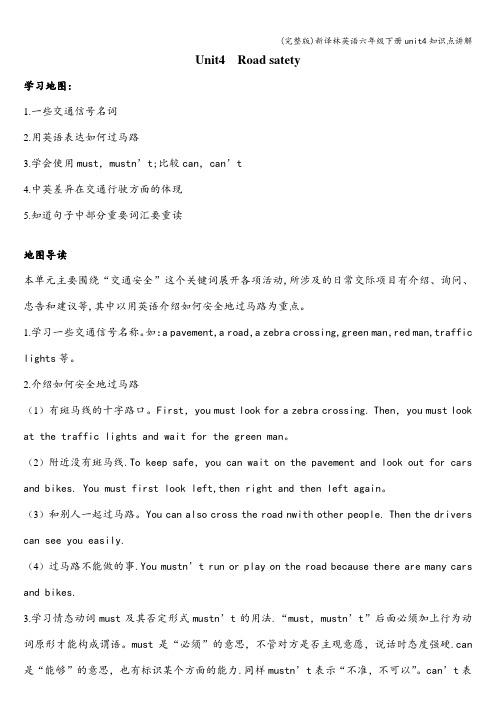
Unit4 Road satety学习地图:1.一些交通信号名词2.用英语表达如何过马路3.学会使用must,mustn’t;比较can,can’t4.中英差异在交通行驶方面的体现5.知道句子中部分重要词汇要重读地图导读本单元主要围绕“交通安全”这个关键词展开各项活动,所涉及的日常交际项目有介绍、询问、忠告和建议等,其中以用英语介绍如何安全地过马路为重点。
1.学习一些交通信号名称。
如:a pavement,a road,a zebra crossing,green man,red man,traffic lights等。
2.介绍如何安全地过马路(1)有斑马线的十字路口。
First,you must look for a zebra crossing. Then,you must look at the traffic lights and wait for the green man。
(2)附近没有斑马线.To keep safe,you can wait on the pavement and look out for cars and bikes. You must first look left,then right and then left again。
(3)和别人一起过马路。
You can also cross the road nwith other people. Then the drivers can see you easily.(4)过马路不能做的事.You mustn’t run or play on the road because there are many cars and bikes.3.学习情态动词must及其否定形式mustn’t的用法.“must,mustn’t”后面必须加上行为动词原形才能构成谓语。
must是“必须”的意思,不管对方是否主观意愿,说话时态度强硬.can 是“能够”的意思,也有标识某个方面的能力.同样mustn’t表示“不准,不可以”。
六年级英语下册Unit4知识点梳理
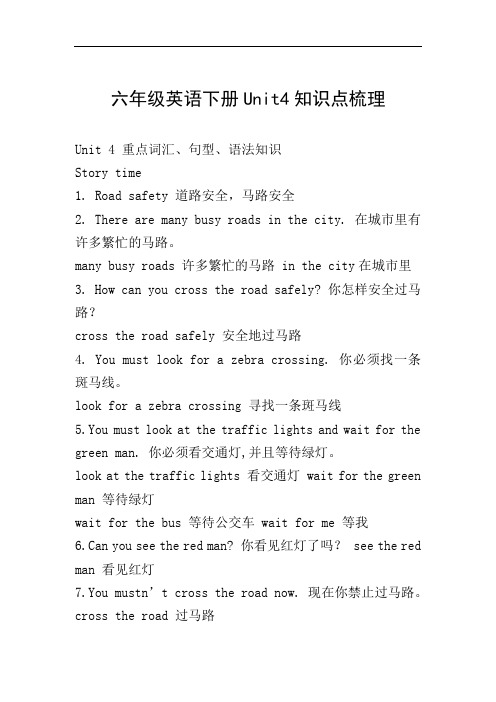
六年级英语下册Unit4知识点梳理Unit 4 重点词汇、句型、语法知识Story time1. Road safety 道路安全,马路安全2. There are many busy roads in the city. 在城市里有许多繁忙的马路。
many busy roads 许多繁忙的马路 in the city在城市里3. How can you cross the road safely? 你怎样安全过马路?cross the road safely 安全地过马路4. You must look for a zebra crossing. 你必须找一条斑马线。
look for a zebra crossing 寻找一条斑马线5.You must look at the traffic lights and wait for the green man. 你必须看交通灯,并且等待绿灯。
look at the traffic lights 看交通灯 wait for the green man 等待绿灯wait for the bus 等待公交车 wait for me 等我6.Can you see the red man? 你看见红灯了吗? see the red man 看见红灯7.You mustn’t cross the road now. 现在你禁止过马路。
cross the road 过马路8.You can cross the road now.你现在可以过马路了。
9. find a zebra crossing near you 在你附近找到斑马线10. To keep safe, you can wait on the pavement and look out for cars and bikes.为保证安全,你可以在人行道上等,并且当心小汽车和自行车。
句首用to表目的,意为“为了……”keep safe = stay safe 保持安全wait on the pavement 在人行道上等待look out for cars and bikes 当心小汽车和自行车look out for 当心,当心11. You must first look left, then right and then left again.你必须先看左边,然后看右边,再看左边。
六年级下册英语各单元总复习资料(五四制)

六年级下册英语各单元总复习资料(五四制)Unit 1: My School Life- Review vocabulary related to school subjects, classrooms, and school activities.- Practice using present tense verbs to talk about daily routines and activities.- Review the use of adverbs of frequency to describe how often activities are done.- Practice asking and answering questions about school life.Unit 2: Festivals and Celebrations- Review vocabulary related to festivals and celebrations.- Practice using present tense verbs to talk about activities and traditions during festivals.- Review the use of prepositions to describe locations.- Practice asking and answering questions about festivals and celebrations.Unit 3: Our Hobbies- Review vocabulary related to hobbies and leisure activities.- Practice using present tense verbs to talk about hobbies and activities.- Review the use of adjectives to describe preferences.- Practice asking and answering questions about hobbies and leisure activities.Unit 4: Our Environment- Review vocabulary related to nature, environment, and weather.- Practice using present tense verbs to talk about environmental issues.- Review the use of modal verbs to express ability and necessity.- Practice asking and answering questions about the environment.Unit 5: Health and Fitness- Review vocabulary related to health, fitness, and sports.- Practice using present tense verbs to talk about health habits and physical activities.- Practice asking and answering questions about health and fitness.- Review the use of possessive pronouns to describe ownership.Unit 7: Travel and Adventure- Review vocabulary related to travel, transportation, and adventure activities.- Practice using present tense verbs to talk about travel experiences and plans.- Review the use of adverbs of manner to describe actions.- Practice asking and answering questions about travel and adventure.Unit 8: Inventors and Inventions- Review vocabulary related to inventors, inventions, and technology.- Practice using present tense verbs to talk about inventors and their inventions.- Review the use of past tense verbs to describe historical events.- Practice asking and answering questions about inventors and inventions.以上是六年级下册英语各单元的总复习资料,希望能帮助您复习和准备考试。
英语六年级下册第四单元
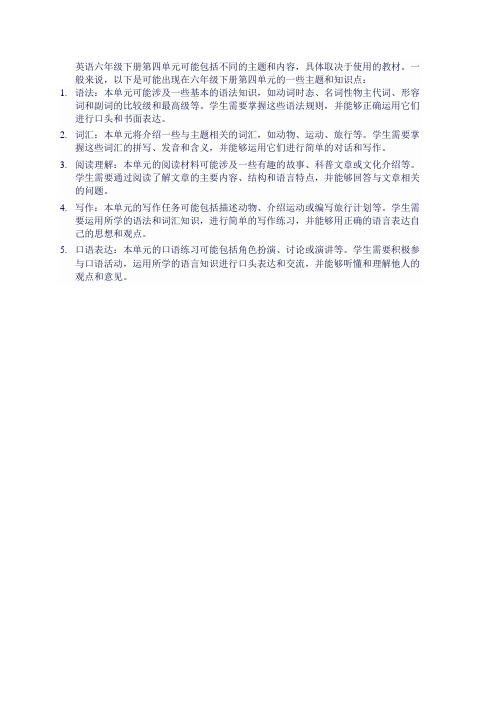
英语六年级下册第四单元可能包括不同的主题和内容,具体取决于使用的教材。
一般来说,以下是可能出现在六年级下册第四单元的一些主题和知识点:
1.语法:本单元可能涉及一些基本的语法知识,如动词时态、名词性物主代词、形容
词和副词的比较级和最高级等。
学生需要掌握这些语法规则,并能够正确运用它们进行口头和书面表达。
2.词汇:本单元将介绍一些与主题相关的词汇,如动物、运动、旅行等。
学生需要掌
握这些词汇的拼写、发音和含义,并能够运用它们进行简单的对话和写作。
3.阅读理解:本单元的阅读材料可能涉及一些有趣的故事、科普文章或文化介绍等。
学生需要通过阅读了解文章的主要内容、结构和语言特点,并能够回答与文章相关的问题。
4.写作:本单元的写作任务可能包括描述动物、介绍运动或编写旅行计划等。
学生需
要运用所学的语法和词汇知识,进行简单的写作练习,并能够用正确的语言表达自己的思想和观点。
5.口语表达:本单元的口语练习可能包括角色扮演、讨论或演讲等。
学生需要积极参
与口语活动,运用所学的语言知识进行口头表达和交流,并能够听懂和理解他人的观点和意见。
六年级下册英语-Unit4知识点整理-译林版
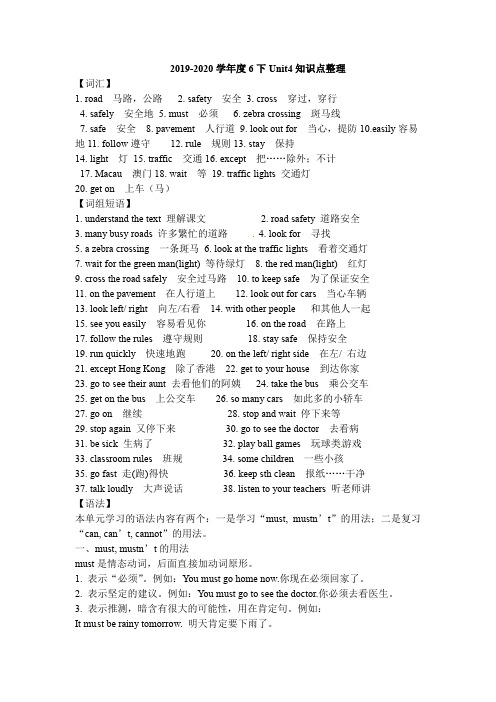
2019-2020学年度6下Unit4知识点整理【词汇】1. road 马路,公路2. safety 安全3. cross 穿过,穿行4. safely 安全地5. must 必须6. zebra crossing 斑马线7. safe 安全8. pavement 人行道9. look out for 当心,提防10.easily容易地11. follow遵守12. rule 规则13. stay 保持14. light 灯15. traffic 交通16. except 把……除外;不计17. Macau 澳门18. wait 等19. traffic lights 交通灯20. get on 上车(马)【词组短语】1. understand the text 理解课文2. road safety 道路安全3. many busy roads 许多繁忙的道路4. look for 寻找5. a zebra crossing 一条斑马6. look at the traffic lights 看着交通灯7. wait for the green man(light) 等待绿灯8. the red man(light) 红灯9. cross the road safely 安全过马路10. to keep safe 为了保证安全11. on the pavement 在人行道上12. look out for cars 当心车辆13. look left/ right 向左/右看14. with other people 和其他人一起15. see you easily 容易看见你16. on the road 在路上17. follow the rules 遵守规则18. stay safe 保持安全19. run quickly 快速地跑20. on the left/ right side 在左/ 右边21. except Hong Kong 除了香港22. get to your house 到达你家23. go to see their aunt 去看他们的阿姨24. take the bus 乘公交车25. get on the bus 上公交车26. so many cars 如此多的小轿车27. go on 继续28. stop and wait 停下来等29. stop again 又停下来30. go to see the doctor 去看病31. be sick 生病了32. play ball games 玩球类游戏33. classroom rules 班规34. some children 一些小孩35. go fast 走(跑)得快36. keep sth clean 报纸……干净37. talk loudly 大声说话38. listen to your teachers 听老师讲【语法】本单元学习的语法内容有两个:一是学习“must, mustn’t”的用法;二是复习“can, can’t, cannot”的用法。
六年级下册英语素材资料 Unit4 Road safety 单元知识 译林版
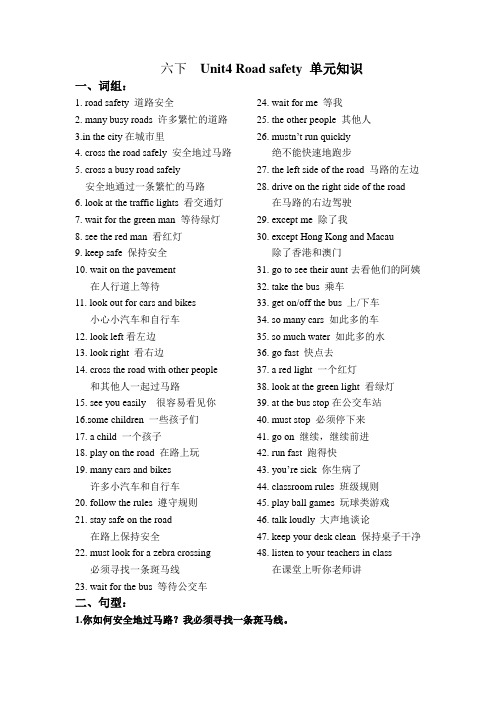
六下Unit4 Road safety 单元知识一、词组:1. road safety 道路安全2. many busy roads 许多繁忙的道路3.in the city在城市里4. cross the road safely 安全地过马路5. cross a busy road safely安全地通过一条繁忙的马路6. look at the traffic lights 看交通灯7. wait for the green man 等待绿灯8. see the red man 看红灯9. keep safe 保持安全10. wait on the pavement在人行道上等待11. look out for cars and bikes小心小汽车和自行车12. look left看左边13. look right 看右边14. cross the road with other people和其他人一起过马路15. see you easily 很容易看见你16.some children 一些孩子们17. a child 一个孩子18. play on the road 在路上玩19. many cars and bikes许多小汽车和自行车20. follow the rules 遵守规则21. stay safe on the road在路上保持安全22. must look for a zebra crossing必须寻找一条斑马线23. wait for the bus 等待公交车24. wait for me 等我25. the other people 其他人26. mustn’t run quickly绝不能快速地跑步27. the left side of the road 马路的左边28. drive on the right side of the road在马路的右边驾驶29. except me 除了我30. except Hong Kong and Macau除了香港和澳门31. go to see their aunt去看他们的阿姨32. take the bus 乘车33. get on/off the bus 上/下车34. so many cars 如此多的车35. so much water 如此多的水36. go fast 快点去37. a red light 一个红灯38. look at the green light 看绿灯39. at the bus stop在公交车站40. must stop 必须停下来41. go on 继续,继续前进42. run fast 跑得快43. you’re sick 你生病了44. classroom rules 班级规则45. play ball games 玩球类游戏46. talk loudly 大声地谈论47. keep your desk clean 保持桌子干净48. listen to your teachers in class在课堂上听你老师讲二、句型:1.你如何安全地过马路?我必须寻找一条斑马线。
pep(人教版)六年级英语下册 Unit 4 (2) 单元知识点梳理

第四单元知识点梳理一.必背词汇:dining hall 饭厅ago 以前gym 体育馆…years ago …年前grass 草坪四会词cycling 去骑自行车运动表示过去时间last month 上个月…months ago …月前go cycling 去骑自行车last year 去年ice-skate 滑冰at that time 在那时play badminton 打羽毛球其它:star星easy 容易的look up 查阅Internet 互联网different 不同的active 活跃的race赛跑nothing 没有什么thought 想felt 感觉cheetah 猎豹trip 绊倒woke 醒wake up 醒来at night 在晚上play basketball 打篮球use the Internet 使用互联网wear glasses 戴眼镜dream 梦win the race 赢得比赛have a race with…和…进行一场赛跑二.语法知识:1. 表示以前没有某物的句型There was no + 单数名词或不可数名词+ 过去时间。
There was no library in my old school.There were no + 复数名词+ 过去时间。
There were no computers or Internet in my time.注意:no+ 名词相当于not a / an / any + 名词。
There weren’t any computer rooms at all. There was no gym ,either.2. 表示不喜欢的句型I didn’t like + 名词或动名词。
如:Before I di dn’t like dogs. Before I didn’t like beef. Before I didn’t like going running.3. 表示过去不能做或不会做的句型I couldn’t + 动词原形。
来凤县某小学六年级英语下册 Unit 4 What’s the weather like知识清单素材
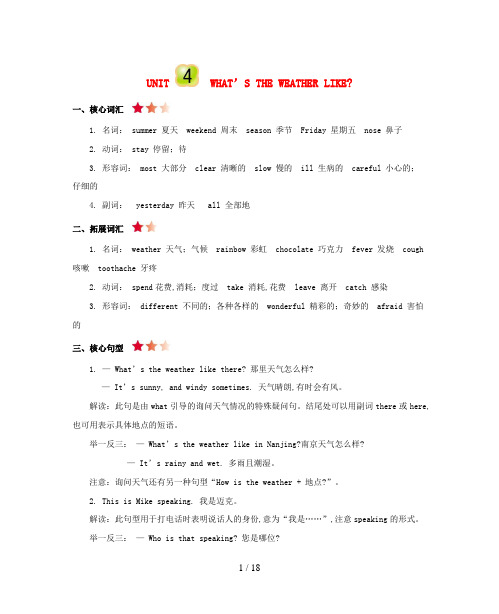
UNIT WHAT’S THE WEATHER LIKE?一、核心词汇1. 名词: summer 夏天weekend 周末season 季节Friday 星期五nose 鼻子2. 动词: stay 停留;待3. 形容词: most 大部分clear 清晰的slow 慢的ill 生病的careful 小心的;仔细的4. 副词: yesterday 昨天 all 全部地二、拓展词汇1. 名词: weather 天气;气候rainbow 彩虹chocolate 巧克力fever 发烧cough 咳嗽toothache 牙疼2. 动词: spend花费,消耗;度过take 消耗,花费leave 离开catch 感染3. 形容词: different 不同的;各种各样的wonderful 精彩的;奇妙的afraid 害怕的三、核心句型1. — What’s the weather like there? 那里天气怎么样?— It’s sunny, and windy sometimes. 天气晴朗,有时会有风。
解读:此句是由what引导的询问天气情况的特殊疑问句。
结尾处可以用副词there或here,也可用表示具体地点的短语。
举一反三:— What’s the weather like in Nanjing?南京天气怎么样?— It’s rainy and wet. 多雨且潮湿。
注意:询问天气还有另一种句型“How is the weather + 地点?”。
2. This is Mike speaking. 我是迈克。
解读:此句型用于打电话时表明说话人的身份,意为“我是……”,注意speaking的形式。
举一反三:— Who is that speaking? 您是哪位?— This is Bob speaking. 我是鲍勃。
3. — How long does it take to get there? 到那儿需要多长时间?— It will only take us three and a half hours to get there by air. 乘飞机到那里只需要三个半小时。
苏教译林版英语 六年级下册 Unit 4 Road safety 知识点总结

苏教译林英语六年级下册Unit 4Road safety 知识点一、词汇road 马路,公路safety安全cross穿过,穿行safely 安全地must必须zebra crossing 斑马线safe安全的pavement人行道look out for当心,提防easily容易地follow遵守rule规则stay 保持light灯二、句型及语法1. There are many busy roads in the city. 在城市里有许多繁忙的马路。
①busy意为“繁忙的”;短语:be busy doing sth. / be busy with sth. 忙于做某事例句:I’m busy doing my homework.①many“很多”,修饰可数名词复数;much“许多”,修饰不可数名词。
2. How can you cross them safely? 你怎么才能安全过马路呢?【注】:“How can you …?”是询问对方怎么做某事时的用语,意为“你怎样才能…”。
safely为副词“安全地”,用来修饰动词cross。
疑问副词how的用法:①对方式、手段、方法等进行提问How do you come to school? 你怎样来学校?②表问候How are you? 你好吗?/ How do you feel now? 你现在感觉怎么样?③询问天气How is the weather today? 今天天气怎么样?④询问年龄How old are you? 你多大了?⑤询问可数名词的数量,结构为“how many + 可数名词复数形式”How many books do you have? 你有多少本书?⑥how much询问不可数名词的数量或者询问价钱How much is this sweater? 这件毛衣多少钱?⑦how about用来征求意见How about this one?【注】:safely“安全地”,为副词,副词修饰动词cross。
新版PEP小学英语六年级下1--4单元复习资料
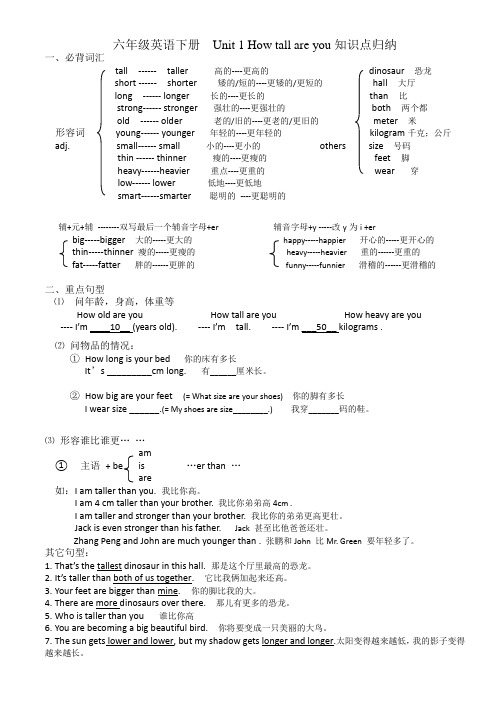
六年级英语下册Unit 1 How tall are you知识点归纳一、必背词汇tall ------ taller 高的----更高的dinosaur 恐龙short ------ shorter 矮的/短的----更矮的/更短的hall 大厅long ------ longer 长的----更长的than 比strong------ stronger 强壮的----更强壮的both 两个都old ------ older 老的/旧的----更老的/更旧的meter 米形容词young------ younger 年轻的----更年轻的kilogram千克;公斤adj. small------ small 小的----更小的others size 号码thin ------ thinner 瘦的----更瘦的feet 脚heavy------heavier 重点----更重的wear 穿low------lower低地----更低地smart------smarter聪明的----更聪明的辅+元+辅--------双写最后一个辅音字母+er 辅音字母+y -----改y为i +erbig-----bigger 大的-----更大的happy-----happier 开心的-----更开心的thin-----thinner瘦的-----更瘦的heavy-----heavier 重的------更重的fat-----fatter 胖的------更胖的funny-----funnier 滑稽的------更滑稽的二、重点句型⑴问年龄,身高,体重等How old are you How tall are you How heavy are you ---- I’m ____10__ (years old). ---- I’m tall. ---- I’m ___50__ kilograms .⑵问物品的情况:①How long is your bed你的床有多长It’s _________cm long. 有______厘米长。
PEP六年级(下册)英语Unit4单元知识梳理(2)

PEP六年级(下册)英语Unit4单元知识梳理(2)Unit 4:1. 单词拼写:- introduce(介绍)- intelligent(聪明的)- favorite(最喜欢的)- twelve(十二)- club(俱乐部)- city(城市)- south(南方)- north(北方)- west(西方)- east(东方)2. 句子翻译:- 我最喜欢的活动是画画和唱歌。
My favorite activities are painting and singing.- 这个学校在南方,我们的学校在北方。
The school is in the south, and our school is in the north.- 她是一个很聪明的女孩。
She is an intelligent girl.- 这是介绍我的新朋友的经历。
This is the experience of introducing my new friend.3. 语法点:- 形容词的比较级和最高级:形容词的比较级由原级加er构成,最高级由原级加est构成。
如:big(大)- bigger(更大)- biggest(最大)- 方位介词的用法:in表示具体位置,如in the park(在公园里);on表示表面位置,如on the table(在桌子上);at表示精确位置,如at home(在家)4. 听力技巧:- 注意细节:仔细听每个句子中的关键词,以便正确回答问题。
- 注意上下文:通过理解对话背景和上下文信息,可以更好地理解听力内容。
- 多听多练:多做听力练习,提高听力技巧和理解能力。
5. 阅读技巧:- 预测内容:在阅读文章之前,先猜测一下文章的大致内容,这样可以帮助理解文章。
- 关注标点:注意句子中的标点符号,这些标点符号可以帮助理解句子的意思和语气。
- 理解上下文:通过理解文章中的上下文信息,可以推测出一些生词的意思。
人教版pep六下英语第四单元重点知识

人教版pep六下英语第四单元重点知识Key points of Unit 4 in People's Education Press (PEP) Grade 6 English1. Vocabulary- Family members: grandfather, grandmother, uncle, aunt, cousin, nephew, niece- Actions: meet, introduce, visit, chat, carry, help, play2. Grammar- Present Continuous Tense: "I am visiting my grandparents." "She is chatting with her aunt."- Possessive adjectives: my, your, his, her, our, their- Prepositions of place: on, in, under, next to, between3. Sentences structures- "Meet my grandfather. This is my grandmother." (Introducing family members)- "Who is that girl? She is my cousin." (Identifying family members)- "I am visiting my aunt this weekend." (Talking about future plans)4. Reading and Comprehension- Reading passages about family activities and relationships- Questions and exercises related to the text- Practice with answering questions in complete sentences5. Writing- Describing family members (e.g. My grandfather has white hair and a friendly smile. He likes to tell stories about his youth.)- Writing short paragraphs about family gatherings or special occasions- Composing letters or emails to family members6. Listening and Speaking- Listening to dialogues about family members meeting and talking- Role-playing exercises for introducing family members- Asking and answering questions about family relationships7. Culture and Etiquette- Understanding the importance of family in different cultures- Learning to address family members respectfully (e.g. using titles like "uncle" or "aunt")- Discussing the values of family support and loveOverall, Unit 4 in the PEP Grade 6 English curriculum focuses on vocabulary related to family members, grammar structures like the Present Continuous Tense and Possessive adjectives, reading and writing exercises about family relationships, and listening and speaking activities to practice communication skills. By mastering these key points, students will be able to talk about their families confidently and fluently in English.。
六年级下册英语知识点梳理-Unit4 We can save the animals 教科版(广州

目标短语目标句型1.有一个问题是他们的居住地正在消失。
______________________________________________2.很多人购买由这些动物制造的东西,比如药品,皮大衣,甚至是食物。
_____________________________________________________ 3.永远不要买由从濒危的动物制造的东西。
_____________________________________________________4. 如果我们现在不做什么,他们可能永远消失!_____________________________________________________One _________ is that their homes are disappearing. People cut down the forests and _________ the oceans, so these animals have no place to live in. Also, many people buy things ____________ these animals, like medicines, fur coats and even foods.If you love the earth and love the animals, please do something about it.___________ buy things made from animals in danger. Plant trees and don't pollute. If we all_____________ we can still save the animals.目标语言点1.肯定句中并列部分最后两个词用and连接,否定句中用or连接。
例: I like to eat bananas,grapes and oranges.I have a rabbit,a cat and two birds.I don't want to live in a world with no pandas, tigers or whales.I don’t have any toys or pets.2.like除了作“喜欢”讲,还可以用于举例,意思相当于“如,诸如”例: People often keep animals like cats,dogs and rabbits.3. be made from与be made of的辨析词汇释义辨析例句be made from 用…制成成品看不出原材料The medicine is made from animals. be made of 由…制成成品能看得出原材料The table is made of wood.5. If we don't do something now, they may all disappear forever!这句话中包含了一个由if引导的条件状语从句。
人教六年级下unit4重点 - 副本
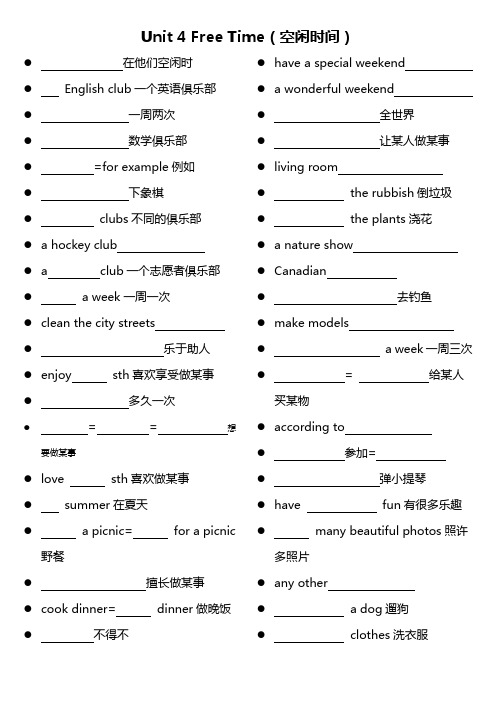
Unit 4 Free Time(空闲时间)●在他们空闲时●English club一个英语俱乐部●一周两次●数学俱乐部●=for example例如●下象棋●clubs不同的俱乐部● a hockey club● a club一个志愿者俱乐部● a week一周一次●clean the city streets●乐于助人●enjoy sth喜欢享受做某事●多久一次●= = 想要做某事●love sth喜欢做某事●summer在夏天● a picnic= for a picnic野餐●擅长做某事●cook dinner= dinner做晚饭●不得不●have a special weekend● a wonderful weekend●全世界●让某人做某事●living room●the rubbish倒垃圾●the plants浇花● a nature show●Canadian●去钓鱼●make models● a week一周三次●= 给某人买某物●according to●参加=●弹小提琴●have fun有很多乐趣●many beautiful photos照许多照片●any other● a dog遛狗●clothes洗衣服Bill和Ted在空闲时间做什么?Bill和Ted的爱好是什么?Bill擅长什么运动?你明天打算做什么?你做什么有趣的事?我最喜欢滑冰。
她有时帮爸爸洗车。
我度过了一个美好的周末你的周末怎么样Unit 4 Free Time(空闲时间)●in their free time在他们空闲时●an English club一个英语俱乐部●twice a week一周两次● a maths club数学俱乐部●such as=for example例如●play chess下象棋●different clubs不同的俱乐部● a hockey club一个曲棍球俱乐部● a volunteer’s club一个志愿者俱乐部●once a week一周一次●clean the city streets打扫街道●enjoy helping others乐于助人●enjoy doing sth喜欢享受做某事●how often多久一次●want to do=would like to do=feel like doing想要做某事●love doing sth喜欢做某事●in summer在夏天●have a picnic=go for a picnic野餐●be good at doing sth擅长做某事而●cook dinner=make dinner做晚饭●have to不得不●have a special weekend有一个特殊的周末● a wonderful weekend一个美好的周末●all over the world全世界●ask sb to do sth让某人做某事●living room起居室●take out the rubbish倒垃圾●water the plants浇花● a nature show一个自然节目●Canadian加拿大人●go fishing去钓鱼●make models做模型●three times a week一周三次●buy sb sth= buy sth for sb给某人买某物●according to根据●join参加=take part in●play the violin弹小提琴●have a lot of fun有很多乐趣●take many beautiful photos照许多照片●any other任何一个●walk a dog遛狗●wash clothes洗衣服Bill和Ted在空闲时间做什么?What do Bill and Ted do in their free time?Bill和Ted的爱好是什么?What are Bill’s and Ted’s hobbies?Bill擅长什么运动?What sports is Bill good at?你明天打算做什么?What are you going to do tomorrow?你做什么有趣的事?What do you do for fun?我最喜欢滑冰。
小学;六年级下册英语第四单元复习资料
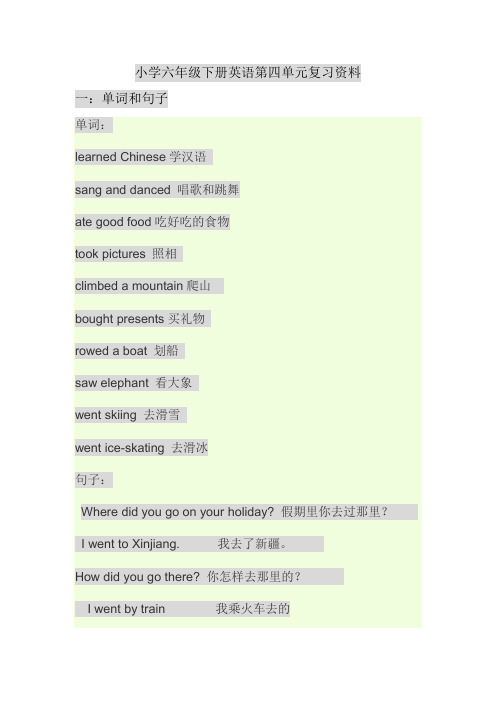
小学六年级下册英语第四单元复习资料一:单词和句子单词:learned Chinese学汉语sang and danced 唱歌和跳舞ate good food吃好吃的食物took pictures 照相climbed a mountain爬山bought presents买礼物rowed a boat 划船saw elephant 看大象went skiing 去滑雪went ice-skating 去滑冰句子:Where did you go on your holiday? 假期里你去过那里?I went to Xinjiang. 我去了新疆。
How did you go there? 你怎样去那里的?I went by train 我乘火车去的二:课文三:过去式的词watch 过去式:watched wash 过去式:washed clean 过去式:cleanedplay 过去式:played visit 过去式:visited do 过去式:did cook 过去式:cookedgo 过去式:went is/am 过去式:was are过去式:were read 过去式:readstudy过去式:stuied learn过去式:learned sing 过去式:sang dance过去式:dancedeat过去式:ate take过去式:took climb过去式:climbed have过去式:hadbuy过去式:bought row过去式:rowed see过去式:saw leave过去式:left get过去式:gotfly过去式:flew walk过去式:walked jump过去式:jumped run过去式:rantell过去式:told show过去式:showed look过去式:looked want过去式:wantedsay过去式:sald wait过去式:waited come过去式:came stay过去式:stayeddrink过去式:drank ask过去式:asked arriv过去式:arrived。
人教版小学英语六年级下册第四单元复习要点
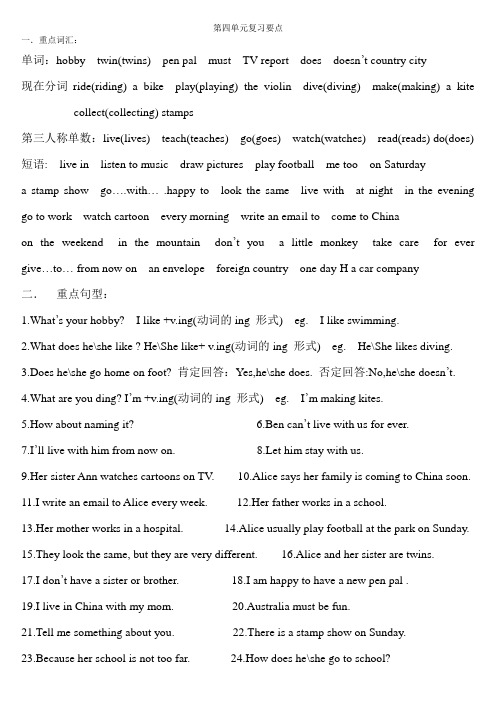
第四单元复习要点一.重点词汇:单词:hobby twin(twins) pen pal must TV report does doesn’t country city现在分词ride(riding) a bike play(playing) the violin dive(diving) make(making) a kite collect(collecting) stamps第三人称单数:live(lives) teach(teaches) go(goes) watch(watches) read(reads) do(does) 短语: live in listen to music draw pictures play football me too on Saturdaya stamp show go….with… .happy to look the same live with at night in the evening go to work watch cartoon every morning write an email to come to Chinaon the weekend in the mountain don’t you a little monkey take care for ever give…to… from now on an envelope foreign country one day H a car company二.重点句型:1.What’s your hobby? I like +v.ing(动词的ing 形式) eg. I like swimming.2.What does he\she like ? He\She like+ v.ing(动词的ing 形式) eg. He\She likes diving.3.Does he\she go home on foot? 肯定回答:Yes,he\she does. 否定回答:No,he\she doesn’t.4.What are you ding? I’m +v.ing(动词的ing 形式) eg. I’m making kites.5.How about naming it?6.Ben can’t live with us for ever.7.I’ll live with him from now on. 8.Let him stay with us.9.Her sister Ann watches cartoons on TV. 10.Alice says her family is coming to China soon.11.I write an email to Alice every week. 12.Her father works in a school.13.Her mother works in a hospital. 14.Alice usually play football at the park on Sunday.15.They look the same, but they are very different. 16.Alice and her sister are twins.17.I don’t have a sister or brother. 18.I am happy to have a new pen pal .19.I live in China with my mom. 20.Australia must be fun.21.Tell me something about you. 22.There is a stamp show on Sunday.- 三.反义词:this—that different—same new—old always—never boy—girl little—big 四.同音词:say—see—sea or—all五.现在分词:①去e加ing make—making take—taking come—coming live—living like—liking write—writing ride—riding dive—diving have—having②直接加ing do—doing listen—listening collet—colleting play—playing③双写词尾加ing swim—swimming sit—sitting run—running 六.第三人称单数:do—does like—likes go—goes watch—watches teach—teaches read—reads come—comes七.主要语法:(1)like 后加动词的ing 形式eg. I like sing ing. He\She likes cook ing.(2) like to 后接动词原形。
- 1、下载文档前请自行甄别文档内容的完整性,平台不提供额外的编辑、内容补充、找答案等附加服务。
- 2、"仅部分预览"的文档,不可在线预览部分如存在完整性等问题,可反馈申请退款(可完整预览的文档不适用该条件!)。
- 3、如文档侵犯您的权益,请联系客服反馈,我们会尽快为您处理(人工客服工作时间:9:00-18:30)。
六下Unit4----Recycle 复习资料一、单词。
1、dining hall 饭厅2、easy 容易的3、grass 草坪4、look up 查阅5、gym 体育馆6、Internet 互联网7、ago 以前8、different 不同的9、cycling 骑自行车运动10、active 积极的;活跃的 11、go cycling 去骑自行车12、race 赛跑 13、ice- skate 滑冰 14、badminton 羽毛球运动15、nothing 没有什么 16、star 星 17、cheetah 猎豹18、dream 梦 19、before 之前 20、American 美国人21、motel 汽车旅馆 22、Café咖啡馆 23、change 变化24、member 成员 25、suddenly 突然 26、cavemen 原始人27、earth 地球 28、humans 人类 29、whale 鲸鱼30、else 还 31、mind 思维 32、difficult 困难的33、invitation 邀请 34、farewell 告别 35、activtie 活动36、prize 奖品 37、candy 糖果 38、design 设计39、promise 保证 40、middle 中间的 41、bring 带上二、短语。
1、very much 非常,很2、no gym either 也没有体育馆3、 run fast 跑得快4、play basketball well 篮球打得好5、at all 根本6、see stars 看星星7、at night 在晚上 8、took about five day 用了大约五天9、get there 到达那里 10、visit the moon 探访月球11、on the internet在网上 12、twenty years ago 二十年前13、in my time 在我的年代里 14、last year 去年15、use the Internet 使用互联网 16、come and look 来看看17、Mike’s old photos 迈克的老照片 18、have a race with …和…赛跑19、help the earth 帮助地球 20、bright future 光明的未来21、heal the world 拯救世界 22、middle school 中学23、farewell party 告别晚会 24、say goodbye 说再见25、give prizes for 为…颁奖 26、good luck 祝好运27、write noon 尽快回信 28、have a good trip 旅途愉快29、keep it touch 保持联系 30、take care 保重31、in Grade 7 在7年级 32、did not = didn’t没有33、was not = wasn’t不是 34、were not = weren’t不是35、could not = couldn’t不能三、句型。
1、There was no gym in my school twenty years ago. Now there’s anew one in our school.二十年我的学校没有体育馆。
现在我们学校有一个。
2、There were no computers or Internet in my time.在我的年代里没有电脑和互联网。
3、 We can look it up on the Internet. 我们可以在互联网上查阅。
4、We didn’t have a library,and there weren’t any computer roomsat all. 我们没有图书馆,也根本没有电脑室。
5、One day I’m going to visit the moon. 有一天我将会去探访月球。
6、The Americans took abount five days to get there in 1969.在1969年美国人花了大约5天时间到达那里。
7、I didn’t like winter before. I thought it was too cold, and Icouldn’t go cycling.我以前不喜欢冬天。
我觉得天气太冷了,而且我也不能去骑自行车。
8、Before, I was quiet. Now, I’m very active in class.以前我很文静。
现在我在班上很活跃。
9、I was short, so I couldn’t ride my bike well. Now, I go cyclingevery day. 以前我个子小,自行车骑得不好。
现在,我每天都骑自行车。
10、There was no library ,there was no gym ,either.没有图书馆,也没有体育馆。
11、What was Grandpa’s school like ? 爷爷的学校是什么样子的?12、How did Mike change? 迈克是怎样改变的?13、What did you dream about last night? 你昨晚梦到什么?14、There are many animals in the race. 有许多动物在赛跑。
15、There was nothing he could do .他什么事情也做不了。
16、Yifan drank it and suddenly he felt good.一帆喝了水后突然感觉很好。
17、There was a second race. 第二次赛跑开始了。
18、Wu Yifan run like a cheetah. 吴一凡跑得像一只豹子。
19、But suddenly he tripped and fell. 但是突然他绊了一下摔倒了。
20、What happened then? 发生什么事了?21、In 2050,there will be house robots。
在2050年,将会有家务机器人。
22、There are more and more buildings. 有越来越多的建筑物。
23、Before humans lived on the earth,whales already lived in the sea.当人类居住在地球前,鲸鱼已住在海洋里。
24、If we change now,whales and humans will have a bright future.如果我们现在改变,鲸鱼和人类将会有一个光明的未来。
25、Make it a better place. 让它成为一个更好的地方。
26、It’s time to leave our school. 该离开我们的学校了。
27、We are all going to middle school soon. 不久我们都要上中学了。
28、So we will say goodbye to each other. 所以我们将互相说再见。
29、We are going to give prizes for the best pictures. 我们将会给最好的图画颁奖。
30、We will also give prizes for our good students. 我们也将会给最好的学生颁奖。
四、语法知识:1. 表示以前没有某物的句型There was no + 单数名词或不可数名词 + 过去时间。
如:There was no library in my old school.There were no + 复数名词 + 过去时间。
如:There were no computers or Internet in my time.注意: no+ 名词相当于not a / an / any + 名词。
例如:There weren’t any computer rooms at all. There was no gym ,either.2. 表示不喜欢的句型I didn’t like + 名词或动名词。
如:Before I didn’t like dogs. Before I didn’t like beef. Before I didn’t like going running.(like 后动词加ing)3. 表示过去不能做或不会做的句型I couldn’t + 动词原形。
I couldn’t go cycling before. People couldn’t use the Internet in the Tang dynasty.4. 如何描述某人过去和现在的不同情况①外貌和性格:Before, 主语+was / were +形容词. Now,主语+am / is / are +形容词.Before I wasn’t tall. I was quiet. Now I am tall. I am active. Before she had short hair. Now she has long hair.Before he didn’t wear glasses. Now he wears glasses.②能力方面:Before, 主语+couldn’t +动词原形. Now, 主语+can +动词原形.Before I couldn’t swim. Now I can swim very well.③爱好方面:Before, 主语+didn’t like +名词 / 动词ing. Now, 主语+like +名词 /动词ing.Before he didn’t like reading books. Now he likes reading books.五、动词过去式:can----could can’t----could n’t take----tookdo---- did don’t ---didn’t think-----thought。
